
India Real Food Adventure Itinerary
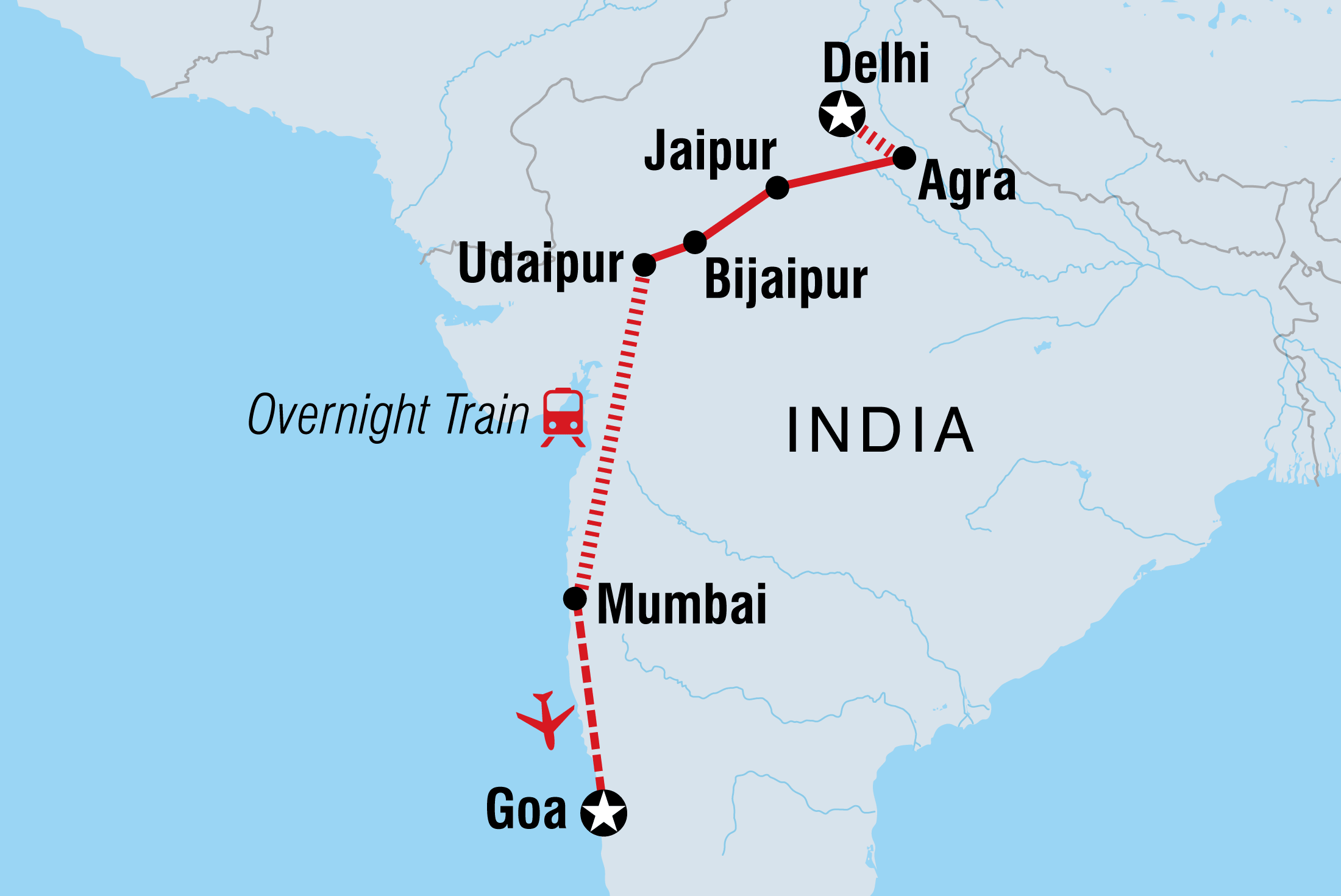


Namaste! Welcome to India. Delhi is an exciting and chaotic capital city filled with historical sites, museums, galleries, shops and bazaars. Your adventure begins with a welcome meeting at 6 pm tonight where you’ll meet your local leader and fellow travellers. After, celebrate the start of your adventure with a short stroll to a local restaurant for your first taste of North Indian cuisine – a delicious (and completely vegetarian) thali feast. A thali is an assortment of small dishes put together on one platter – the perfect way to sample a range of flavours. After, your leader will take you to a hole-in-the-wall eatery where you may like to sample some of Delhi’s best kulfi falooda, (a delicious ice cream-style dessert).
Ready your appetite and venture out to Old Delhi, wandering through alleyways for an authentic Delhi street food breakfast. Maybe pick up some bedmi, potato curry, sweet fried jalebi or paratha flatbread. Keep your eye out for the local chai wallah, renowned for his delicious milky tea. Next, jump on the city's metro system and head to Jama Masjid, Delhi's oldest mosque. After some time at this ancient building, hop aboard a rickshaw and head to Chandni Chowk – one of the oldest and busiest markets in Old Delhi. Visit the spice warehouses in the back alleys of Khari Baoli and meet a seller to learn about the spice mixes they take to market. Visit the Gali Paranthe Wali (lane of parathas). Parathas are one of the most popular unleavened flat breads in Punjabi North Indian cuisine, and you’ll taste some filled with potatoes, cauliflower and paneer. While Hinduism is the dominant religion in Delhi, there is also a significant Sikh population, which you’ll learn more about over a vegetarian lunch at a local Sikh temple. Tonight, you’ve got the option to visit a local family for a home-cooked meal. This provides an insight into the day-to-day life of Delhites, so find out some secret recipes, get involved or just chat with your welcoming hosts.
Jump aboard a local train for an air-conditioned ride to Agra. Famed for one of the Seven Wonders of the World, the Taj Mahal, Agra is a city of fascinating history, rich in Mughal heritage. Agra is also home to one of the finest looking forts in India – Agra Fort. Enter the dark red sandstone stronghold and search through throne rooms and tiny but ornate mosques. After, head to the Taj Mahal to explore the grounds and take in the changing scenes as day turns to evening – a truly unforgettable experience. For dinner, join a Mughlai cooking demonstration. Influenced by Central Asian and Islamic recipes, Mughlai cuisine is unique and fragrant. Meet a passionate cook who'll teach you how to prepare classics such as malai ki sabzi (vegetables cooked with cream) and onion paratha (flatbread stuffed with onions and potato), depending on the season.
Say goodbye to Agra and drive to the ‘Pink City’ of Jaipur. Jaipur was designed by royalty and has delighted visitors for centuries with its pink-hued buildings and buzzing bazaars. Jump on a rickshaw and swing by one of India's most photographed buildings, the Hawa Mahal or 'Palace of the Winds’, to snap some pictures yourself. Then, you’ll have the chance to try kachori at the iconic Rawat Mishthan Bhandar for lunch, (a deep fired snack that is typically made from a spiced dough usually filled with vegetables and lentils), a locals' favourite. Other Rajasthani delicacies include breads made of five diffrent flours and served with curries. In the evening, you may like to check out the extravagance of a Bollywood blockbuster, with all the Hollywood-style elements of action, romance, drama and music (sometimes all rolled into one), at the Raj Mandir Cinema.
Travel out to the old capital of Amber and explore the hilltop complex known as the Amber Fort. Overlooking Maota Lake, this opulent palace is the legacy of a fallen empire and a great example of Rajput architecture. One of its most spectacular buildings is the Sheesh Mahal – with its walls completely covered with tiny mirrors, the hall becomes a dazzling fantasy with the light of a single match. For lunch, follow your leader to LMB, a local restaurant opened in 1727. Try their Ghevar! After the meal, If sweets are more your thing, try the mawa kachori (deep-fried pastry stuffed with dried fruits and milk solids, coated in sugar syrup). To finish the day in style, head to a local home for a hands-on cooking class where you’ll learn how to make some plant-based Rajasthani dishes like ker sangri, using dried ker berries and sangri beans. Enjoy the fruits of your labour in the peaceful garden of your hosts, where they grow fresh greens.
Leave the city behind and drive to a local heritage stay located in the Vindhyanchal Hills in the Mewar region of south-central Rajasthan – a great opportunity to learn about rural life and culinary customs. You’ll for lunch along the way at a local restaurant. Your accommodation for the next two nights will be at 16th-century Castle Bijaipur – now a heritage hotel with domes, arched windows and doorways, all within the original fortified walls. Take in the palace’s blend architecture as you relax by the pool or in the gardens, enjoying the famous Mewar hospitality.
Today you’ll jump in a jeep and explore the surrounding farming communities. This is a major agricultural area and, depending on the season, you’ll pass through fields growing wheat, corn, maize, lentils, aubergine, spinach, fenugreek, okra, green chilies, tomatoes, potatoes, gourd, onion and garlic. Some of India’s most-loved spices, such as turmeric and cumin, are also grown here. Return to your heritage stay and join the estate's chef to discover how the ingredients you’ve seen today are used in Rajasthani cooking. Savour the results over a delicious lunch in the palace grounds with your group.
Travel to Udaipur – a charming city known for its Hindu temples and palaces, and small but renowned Jain temples. Jainism is a minority religion in India and is considered among the most rigorous and spiritually motivated diets in India. When you arrive, visit a Jain temple where you’ll learn about the religion and the food connected to it. Jain cuisine is strictly vegetarian and excludes the eating of root vegetables like carrots, onion and garlic due to the belief that uprooting the plant kills it and the micro-organisms around the roots. Taste Jaainist cuisine at the famous Natraj restaurant, serving delicious Jain thali since 1960's! Tonight, you’ll have a free evening for dinner. Udaipur has several inviting rooftop restaurants, so climb some stairs, choose a restaurant and settle in to watch the sun set over one of the city’s shimmering central lakes.
Udaipur, also known as the 'City of Lakes', is built around the shores of Lake Pichola and full of fascinating temples, ornate palaces and impressive 'havelis' (merchant homes). Take some time to discover its winding streets and shops full of traditional Rajasthani wares. Visit the City Palace – one of the largest royal palaces in India – and check out the unbelievable treasures within, from vivid murals to antiques and royal utensils. The rest of the day is free for your own exploration.
Awaken your senses this morning with a visit to a local market to browse fragrant stalls and collect ingredients for a cooking class, where you’ll learn how to prepare a traditional north Indian thali meal. Thali varies depending on which region it’s prepared in, and as you’re in Udaipur, you’ll make a vegetarian thali. Typical dishes include rice, dahl, vegetables, roti, papad (deep-fried flat bread), curd (yoghurt), small amounts of chutney or pickle and a sweet dish to top it off. After all that cooking, enjoy the fruits of your labour for lunch. After, head to the Abu Road train station. Tonight, you’ll board an overnight train bound for one of India's great cities – Mumbai. The train will depart late evening and arrive after midday tomorrow.
Arrive in Mumbai after your overnight train, reaching your hotel by mid-afternoon. Known as Bombay until its name change in 1995, Mumbai is India's commercial capital and largest city. Some would say that Mumbai is also the food capital of India. This is the heart of Marathi cuisine, but you’ll also find huge culinary diversity that celebrates regional cuisines from across the country. In the late afternoon, wander down Marine Drive to Chowpatty Beach. Enjoy the sunset and feast on a dinner made of bhel puri (tangy puffed rice and vegetable chaat), pav bhaji dahi papadi and other renowned Mumbai street foods.
Time for some sightseeing and soaking up the atmosphere of this incredible metropolis. See the remarkable Mahalaxmi Dhobi Ghat – at 140 years old this is Mumbai's oldest laundry, and with over 1000 troughs, it’s also the world’s largest open-air, human-powered one. Next, take in some of the city’s key landmarks, including the UNESCO World Heritage-listed historic railway station, Chhatrapati Shivaji Terminus, and the bustling Crawford Markets. For lunch, seek out a restaurant known for serving Parsi cuisine, whose community is largely concentrated in Mumbai. The Parsi peoples are descendants of Zoroastrians who are believed to have emigrated from Persia to India in the 10th century. Enjoy a post-lunch stroll to the Gateway of India – a monument built to commemorate the landing of King-Emperor George V, the first British monarch to visit India – followed by a browse of the Colaba street market. The rest of the afternoon and the evening are free for your own food adventures.
Take a flight from Mumbai to Goa. The locals say that time moves more slowly in Goa, so this is a good opportunity to enjoy a bit of tranquillity in an often-frenetic country. Tinged with a Portuguese flavour, the state of Goa is blessed with lovely beaches, rich traditions, World Heritage-listed buildings and mouth-watering food. After a little rest, venture out for an orientation walk with your tour leader. Enjoy the evening by the Goan beach.
Start the day with a trip to Panjim fish market on the way to Old Goa - a a historic city sitting on the banks of the Mandovi River. While the city is home to around 2500 residents today, between the 16th and 18th centuries Old Goa was a booming spice trade hub with a population of nearly 200,000. Walk through streets lined with ancient churches and historic buildings and check out the local market.
Goa's dense forested areas and favourable climate also make it a perfect location to grow the spices liberally used in its cuisine. Visit a spice farm and learn how they are grown, harvested, processed and prepared for use in food and Ayurvedic medicine. See how these spices come together over a freshly cooked lunch at the spice farm before returning to your hotel. Enjoy the last Goan dinner with your fellow travellers at the famous Suza Lobo restaurant by the ocean. Prawns curry rice, chicken xacuti, masala fried fish. The choice is yours.
Your food adventure comes to an end after breakfast this morning. If you would like to spend more time in Goa, exploring more of the city, just get in touch with your booking agent ahead of time.

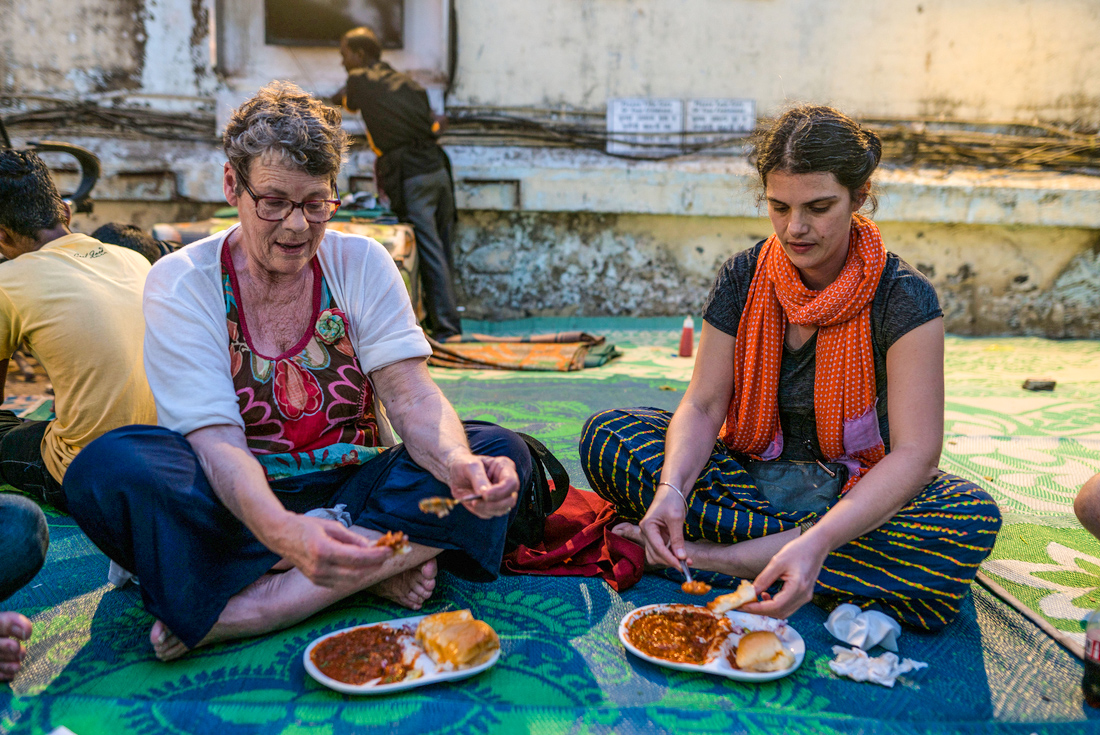
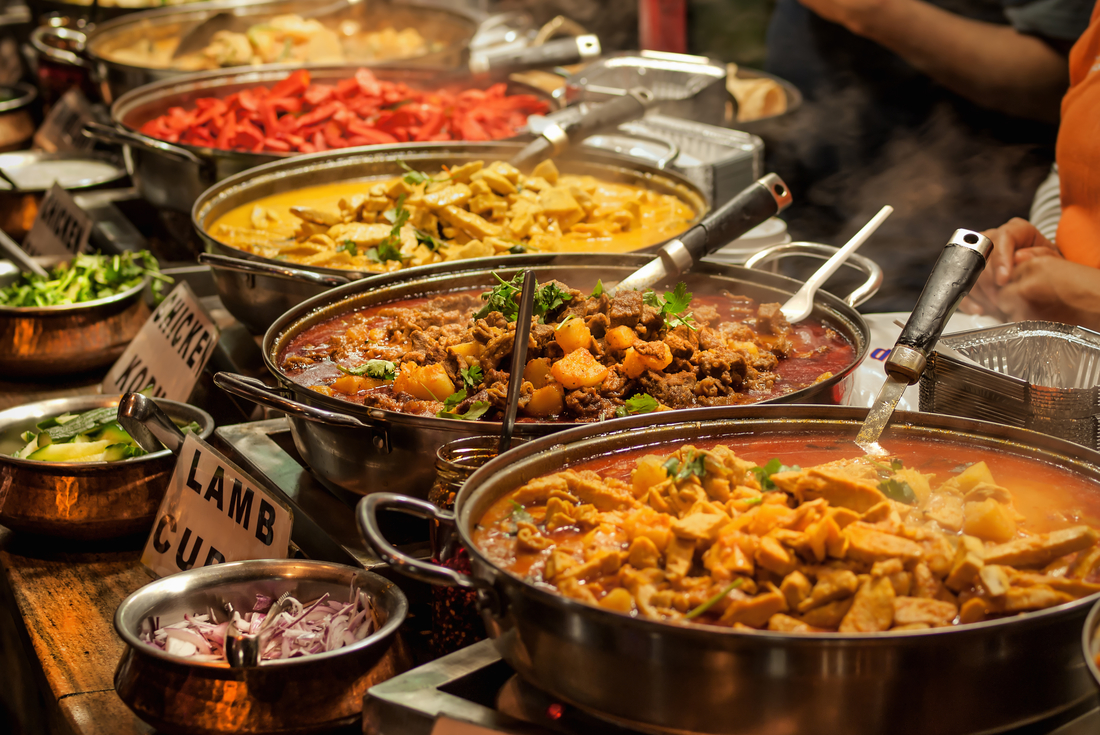
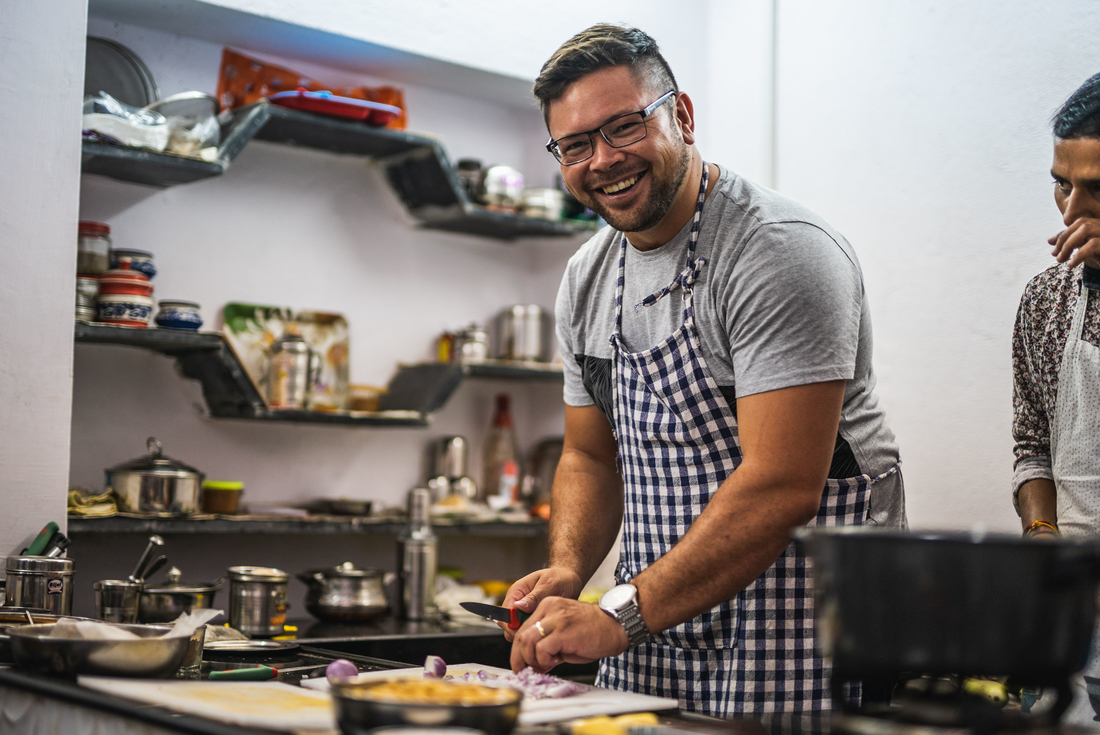
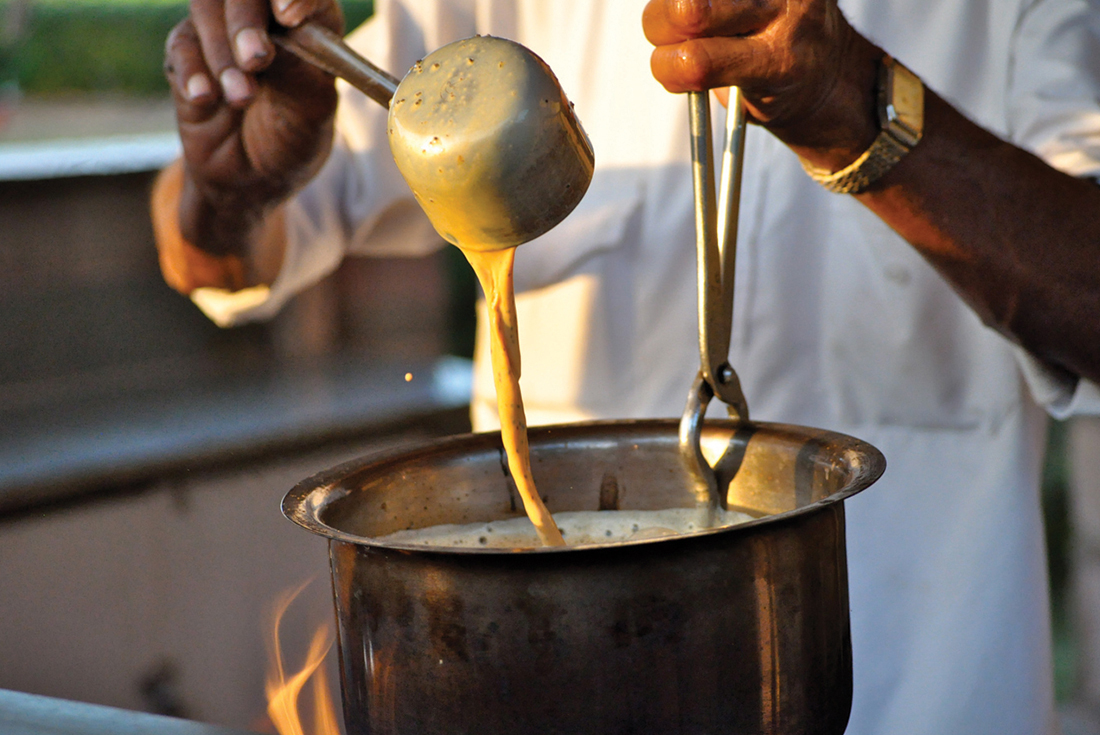
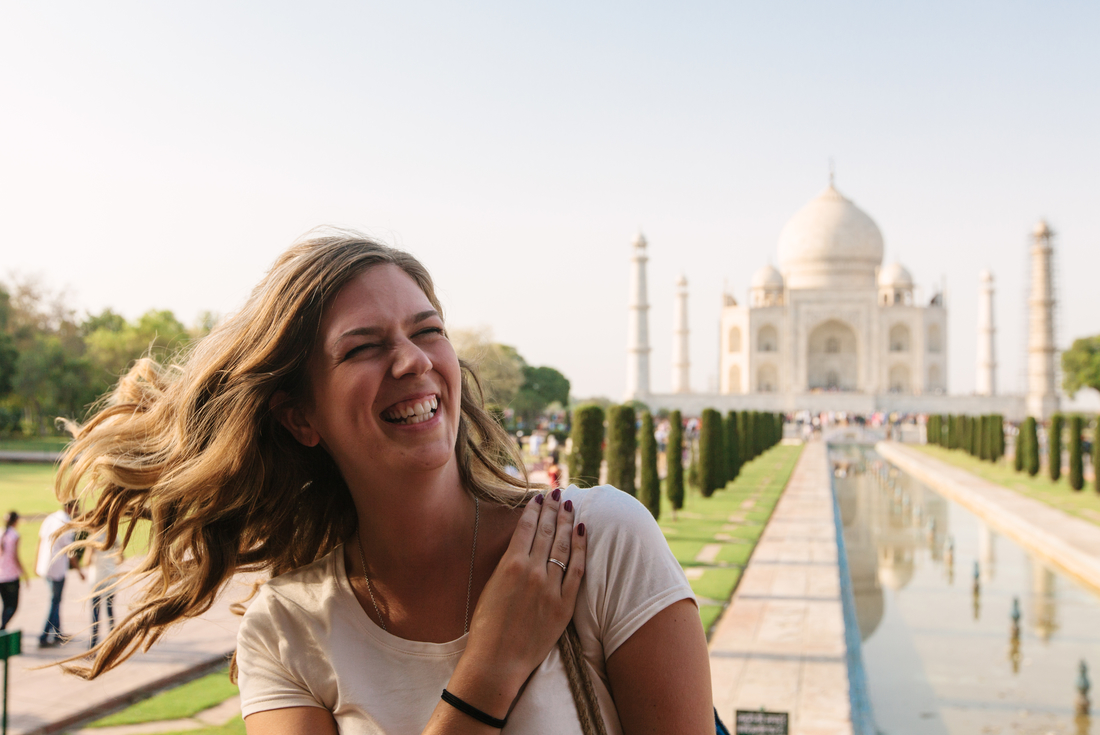
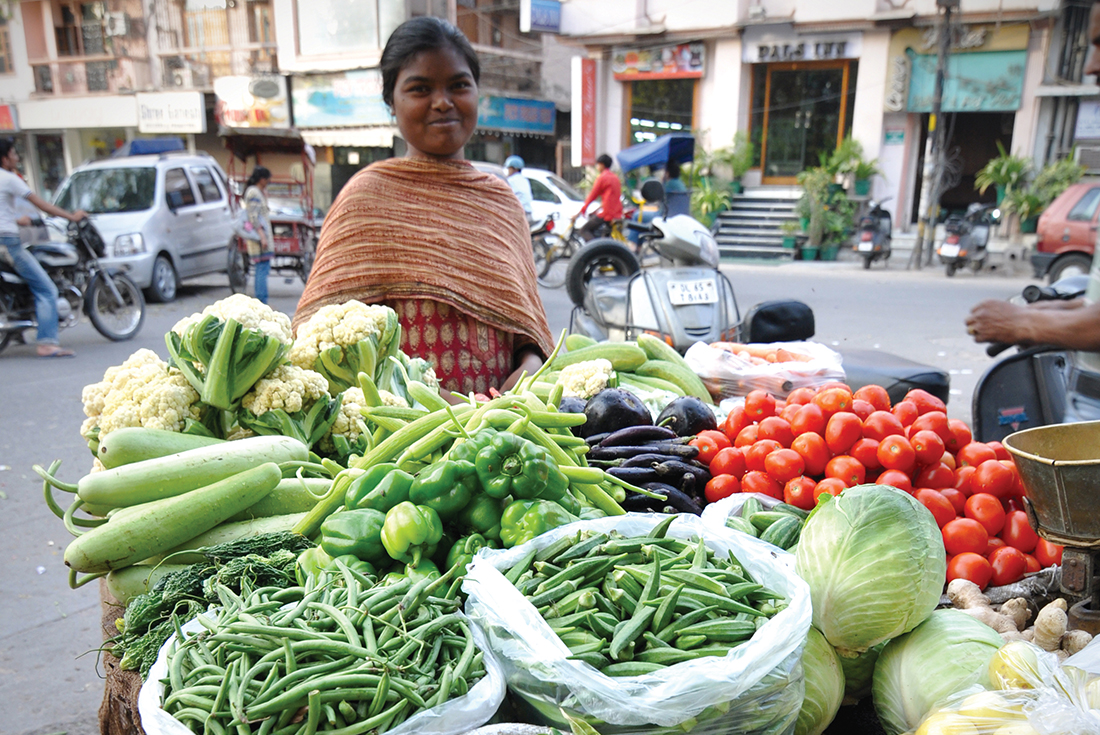
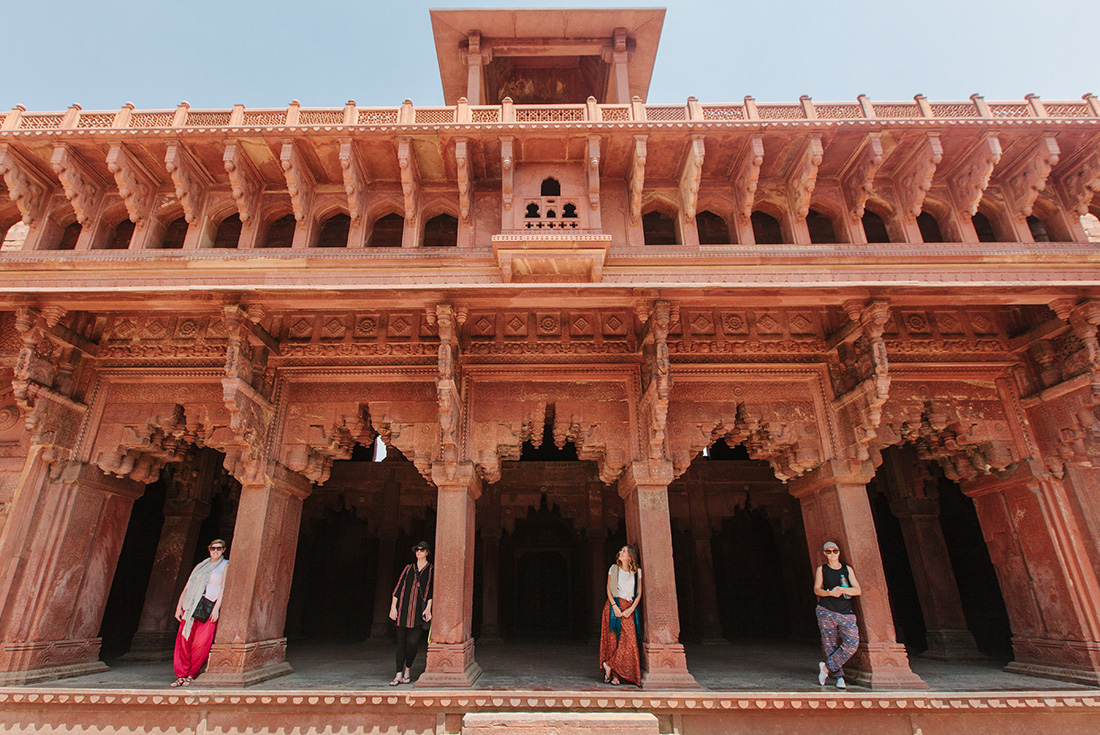
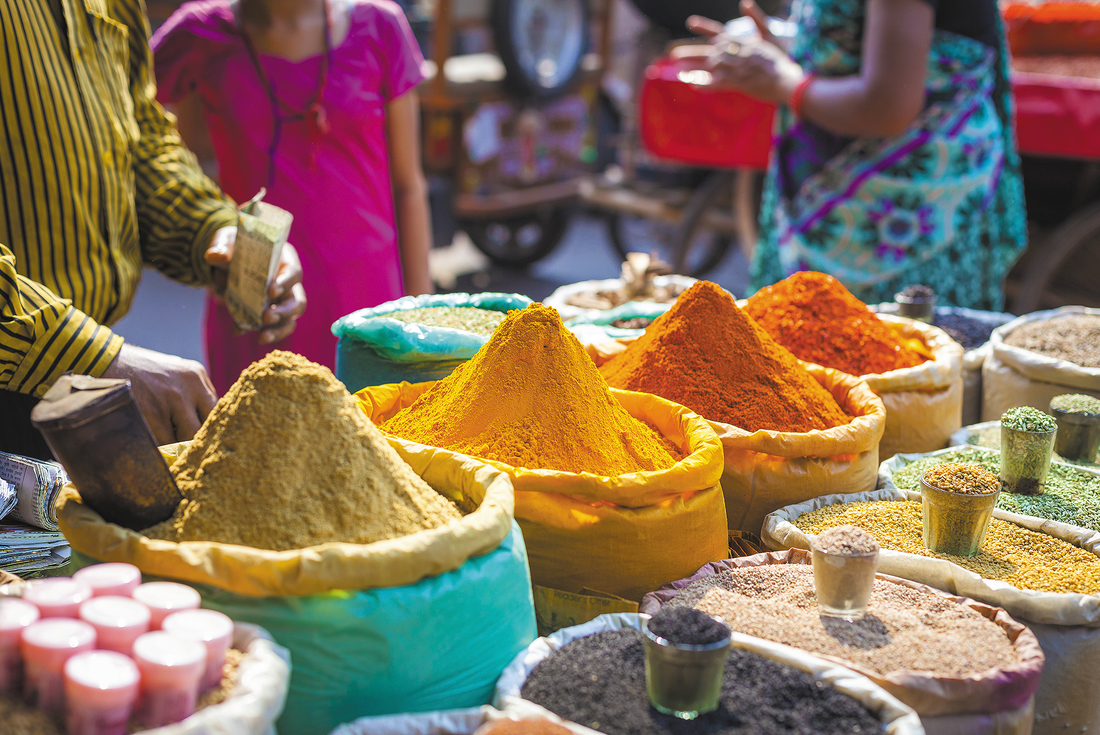
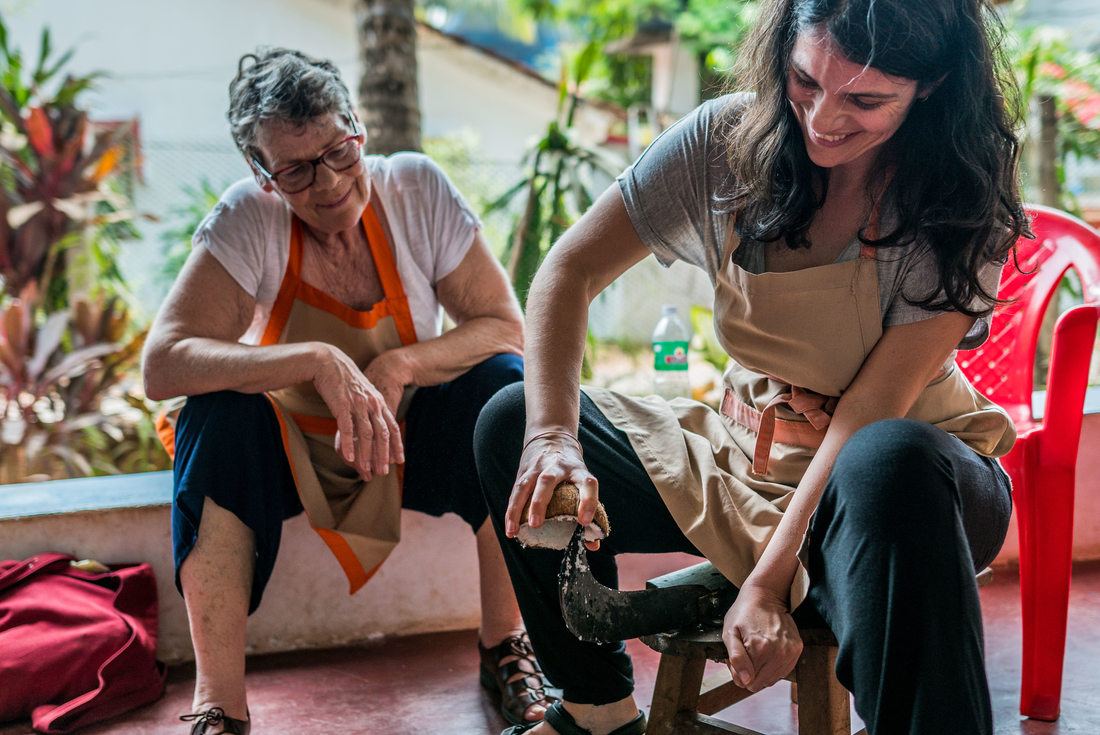
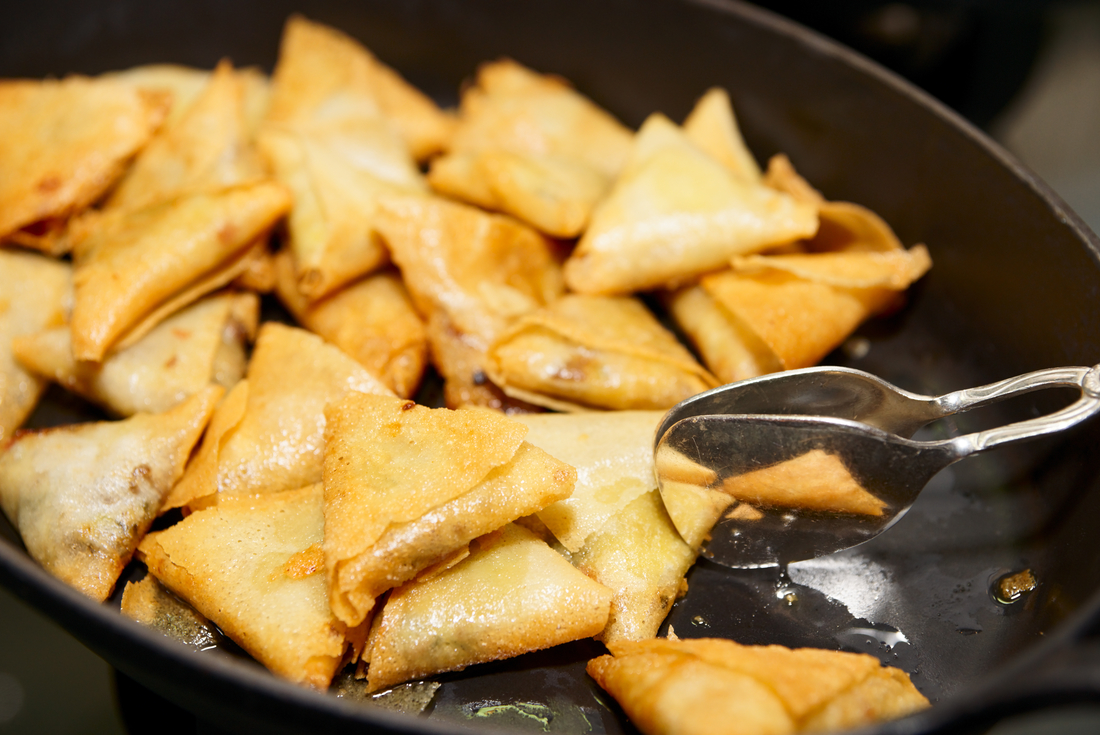
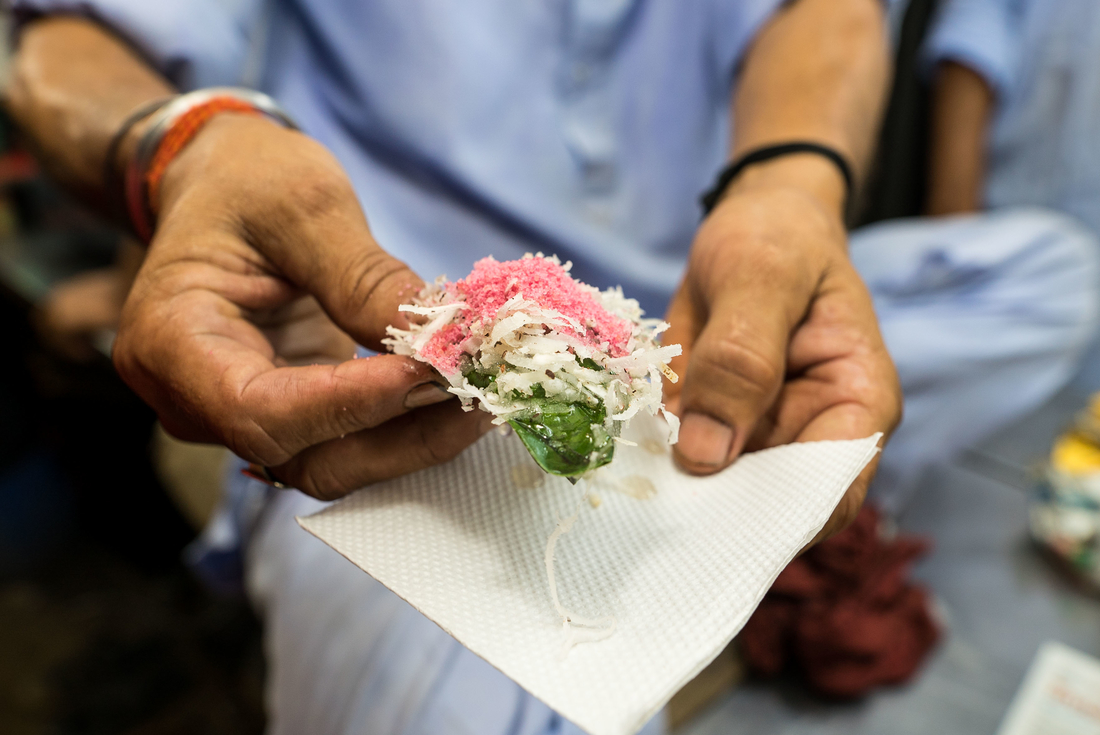
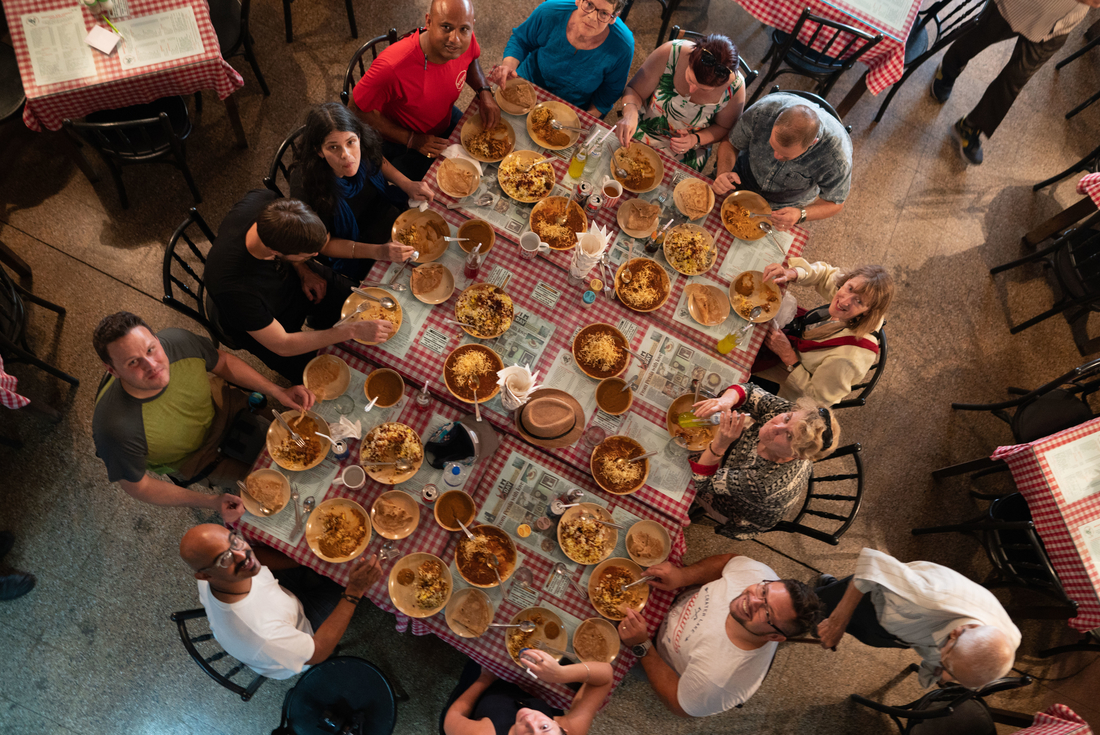
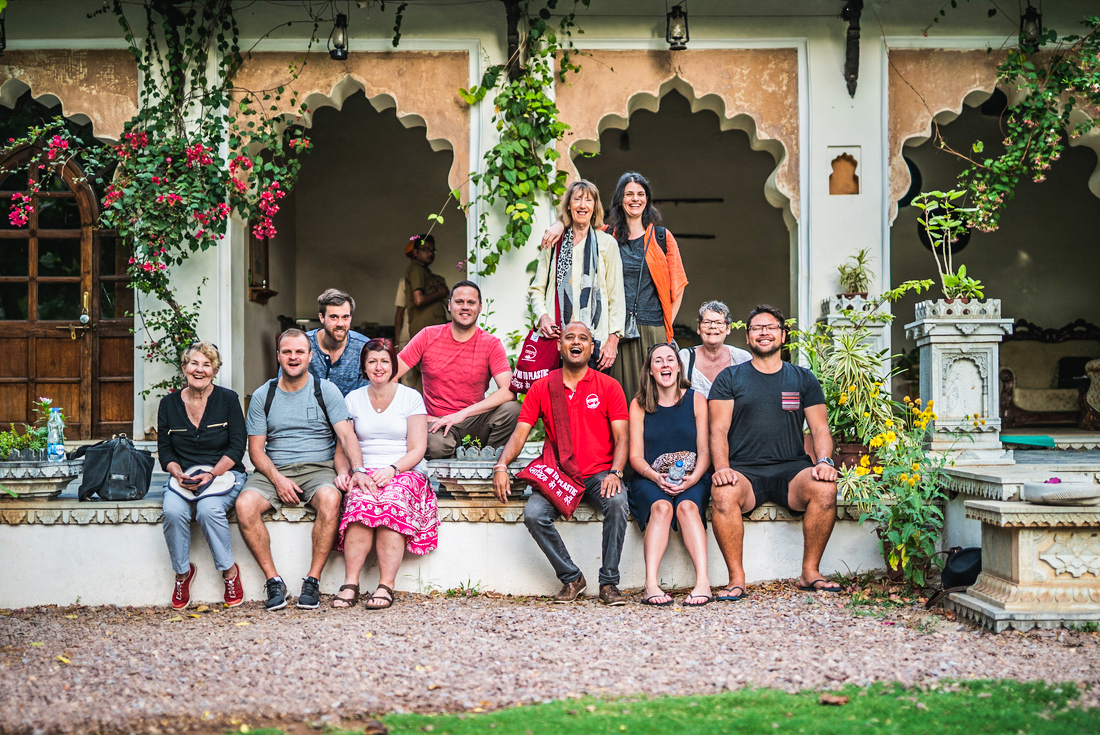
Delhi - Welcome dinner
Delhi - Leader-led Old Delhi walking & rickshaw tour
Delhi - Street Food Breakfast
Delhi - Visit to the Jama Masjid Mosque
Delhi - Lunch at a Sikh Temple
Delhi - Spice warehouse visit
Agra - Agra Fort
Agra - Taj Mahal
Agra - Mughlai Cooking Demonstration
Jaipur - Hawa Mahal photo stop
Jaipur - Leader-led orientation walk
Jaipur - Amber Fort
Jaipur - Street Food Lunch
Jaipur - Rajasthani Cooking Class and Dinner
Bijaipur - Countryside jeep safari
Bijaipur - Rajasthani Desert Cooking Demonstration and Meal
Udaipur - Leader-led orientation walk
Udaipur - Lunch at Jain Restaurant Natraj
Udaipur - City Palace
Udaipur - Thali Cooking Class
Mumbai - Chowpatty Beach Street Food Crawl
Mumbai - Leader-led Heritage Walk
Goa - Leader led Orientation walk
Goa - Old Goa tour
Goa - Spice farm tour including lunch
Get a true taste of some of India's finest culinary traditions – Mughal, Rajasthani, and the Portuguese-tinged flavours of Goa – while feasting in local restaurants, street food stalls, rural homes and cooking classes.
Leave with authentic recipes under your belt after you take part in a plant-based cooking class in a Jaipur home, learn how to make thali in Udaipur and find out how to cook Malvani cuisine in Goa.
See the rich tapestry of India’s culture and history on display, meeting chai wallahs in local markets, visiting local farming communities and spice growers, and dining in Sikh temples.
Bask in the ivory glow of the inspiring Taj Mahal in Agra, explore Old Delhi and Jama Masjid, and stand in awe of the Hawa Mahal and Amber Fort in Jaipur.
Grab a fork and dig in – this trip introduces you to some of India’s most iconic dishes like kachori, kulfi, chai, paratha, chaat, thali and heaps more.
Hotel Surya International, 4/33, Saraswati Marg, W.E.A. , Karol Bagh, Delhi, 110005, INDIA, Phone: +91 9999663111
Kyriad Prestige Calangute, Umta Vaddo, Calangute Bardez , Calangute, Goa, 403516, INDIA, Phone: +91 7410110002
1. A single supplement is available if you’d prefer not to share a room on this trip. The single supplement excludes Day 10 (Overnight Train) where you will be in shared accommodation, and is subject to availability. Please speak to your booking agent for further information.
2. While we endeavour to cater for specific dietary requirements, some meals and food activities are set in advance and may be difficult to adjust. Please advise us of any dietary requirements at the time of booking so that we can ensure you’ll enjoy this trip.
3. Please provide your full name exactly as it appears on your passport at the time of booking (including any middle names listed on your passport) for transport tickets. Ticketing fees may apply for amendments to details within 45 days of departure, and in some cases, you will be required to cover the cost of issuing a new ticket if an amendment occurs.
4. This trip includes domestic flights. The luggage allowance is 15kg for check in luggage and 7kg for carry on.
While we always endeavour to provide the best possible holiday experience, due to the nature of travel and the areas we visit sometimes things can and do go wrong. Should any issue occur while you are on your trip, it is imperative that you discuss this with your group leader or local representative straight away so that they can do their best to rectify the problem and save any potential negative impact on the rest of your trip.
We recognise that there may be times when your group leader or local representative may not be able to resolve a situation to your satisfaction - if this is the case, please ask the group leader or local representative to speak to their direct manager.
You may also choose to provide details in your online feedback, which we ask you to complete within 30 days of the end of your trip. Please do be aware that it is very difficult for us to provide any practical help after the trip is completed, so informing us while still travelling will give us the opportunity to resolve the issue in real-time., For general contact details please use the following page: https://www.intrepidtravel.com/contact-us, In case of a genuine crisis or emergency, you can reach our local office on the numbers below:
, Available for phone call or WhatsApp call on +91 999 900 5019
India is a great food destination for vegetarians. With wonderful fresh produce and many delicious local dishes, you'll have a great time on this trip. For vegans we recommend reviewing the itinerary and inclusions to ensure that you will be able to fully participate and enjoy this trip. We also have many other trips to India which can accommodate a range of dietary requirements., India is a big country and there are some long travel days on this departure. Use these as an opportunity to relax, witness everyday life from the window of your vehicle and get to know your fellow travellers., This trip travels by overnight train from Udaipur to Mumbai. While the overnight train can seem a little daunting, it is a very efficient way to travel long distances and maximising time in each place. Long distance and overnight trains can often be delayed and occasionally cancelled due to heavy fog between December and February., This trip stays in a mix of accommodation to experience a variety of Indian life. Standards can vary though – there will be hot water in most but not all hotels., The climate in India can vary in the different states – be prepared for hot sticky days and cooler evenings. Layered clothing is the best way to tackle this disparity in weather., Old Delhi can be very busy and crowded. While it’s an exciting place to see local life moving around you, be aware that on the walking tour you’ll need to navigate through people, tight spaces and walkways.
Get a true taste of some of India's finest culinary traditions – Mughal, Rajasthani, and the Portuguese-tinged flavours of Goa – while feasting in local restaurants, street food stalls, rural homes and cooking classes. , Leave with authentic recipes under your belt after you take part in a plant-based cooking class in a Jaipur home, learn how to make thali in Udaipur and find out how to cook Malvani cuisine in Goa., See the rich tapestry of India’s culture and history on display, meeting chai wallahs in local markets, visiting local farming communities and spice growers, and dining in Sikh temples. , Bask in the ivory glow of the inspiring Taj Mahal in Agra, explore Old Delhi and Jama Masjid, and stand in awe of the Hawa Mahal and Amber Fort in Jaipur., Grab a fork and dig in – this trip introduces you to some of India’s most iconic dishes like kachori, kulfi, chai, paratha, chaat, thali and heaps more.
All Intrepid group trips are accompanied by one of our group leaders. The aim of the group leader is to take the hassle out of your travels and to help you have the best trip possible. You can expect your Intrepid Food Adventures group leader to be passionate about the local food scene and keen to share their insider knowledge on the best authentic local food and drink experiences throughout your trip.
Your leader will provide information on the places you are travelling through, offer suggestions for things to do and see, recommend great local eating venues and introduce you to our local friends. While not being guides in the traditional sense you can expect them to have a broad general knowledge of the places visited on the trip, including historical, cultural, religious and social aspects. At Intrepid we aim to support local guides who have specialised knowledge of the regions we visit. If you were interested in delving deeper into the local culture at a specific site or location then your leader can recommend a local guide service in most of the main destinations of your trip.
TRAVEL ADVISORIES & ALERTS
We recommend that you check your government's foreign travel advisory for the latest information about the destination before you travel. You will also need to ensure that your travel insurance covers you for all destinations and activities on your trip. We also recommend saving the phone number for emergency consular assistance for your government’s consulate in the destination/s you’ll be travelling. Links to travel advisories and any current travel alerts for our trips can be found here: https://www.intrepidtravel.com/travel-alerts
PERSONAL SAFETY
Ensure you have a secure method of carrying your passport, phone, credit cards and cash while travelling such as a money belt. Leave all other high value items, including jewellery, at home Use safety deposit boxes at hotels to store your valuables when available and ensure your luggage is lockable. Be aware of the risk of pick-pocketing and petty theft. Exercise caution when walking at night, don’t walk alone and stick to well-lit streets wherever possible. Be vigilant on public transport and look out for your fellow travellers. Take precautions such as carrying your bag in front of you and never leaving personal items unattended.
LGBTQIA+ TRAVELLERS
Intrepid welcomes all LGBTQIA+ customers on our trips, however we operate in parts of the world that are less accepting. We support LGBTQIA+ customers to travel to these destinations and are committed to ensuring they face no discrimination on any part of the trip we control. We recommend you visit Equaldex (https://www.equaldex.com/) and your government's foreign travel advice for LGBTQIA+ travellers when choosing your trip., https://www.intrepidtravel.com/safety-guidelines, FESTIVALS - HOLI & DIWALI:
Travelling in India and Nepal during Holi can at times be unsafe - drinking and drug use is more widespread during this holiday. Your leader/guide will advise your group on what places to avoid on the day.
It may be necessary to alter your itinerary for the day.
Diwali (a lunar festival generally held from mid October to mid November every year) is celebrated by local people letting off fireworks in the street. It can be very noisy for several days with extra pollution caused by fireworks. As there are no restrictions on buying fireworks in India there are often injuries caused by people exploding them inappropriately.
During this festival your leader/guide may be required to alter your itinerary to avoid large crowds gathering and using fireworks., PETTY THEFT AND PERSONAL SAFETY
While travelling there is always the risk of pick-pocketing and petty theft, particularly in the more touristy cities. We recommend that you exercise caution when walking alone at night and encourage you to walk together and only on main, well-lit thoroughfares. Be particularly vigilant on public transport. Simple measures like carrying your day pack on your front, not hanging your bag over the back of your chair or on the floor and wearing a money belt will reduce any chance that your valuables should go missing., FIRE PRECAUTIONS
Local laws governing tourism facilities in this region may differ from those in your home country and accommodation we use may not have a fire exit, fire extinguishers or smoke alarms., SEAT BELTS:
Please be aware that local laws governing transportation safety may differ from those in your home country and not all the transport which we use is able to provide seat belts., TRAFFIC AND DRIVING ON THE OTHER SIDE OF THE ROAD:
Depending on where you come from please note that drivers in this part of the world may drive on the opposite side of the road from what you are used to. Look both ways before crossing any road. Traffic can be a little more chaotic than you might be used to at home. Be aware!, AIR POLLUTION
The high levels of air pollution in New Delhi (and across urbanised India) may aggravate bronchial, sinus or asthma conditions. Children, the elderly and those with pre-existing medical conditions may be especially affected. Please ensure you bring the required medication with you if you have any of these type of medical conditions.
You can check the pollution index levels for many cities on the following website: http://safar.tropmet.res.in/
Our tour leaders have a supply of masks for sale at the joining meeting should you wish to purchase one.
PASSPORT
You’ll need a valid passport to travel internationally and most countries require your passport to have a minimum of 6 months validity, so remember to check the expiry date.
We need your passport information to get everything ready for your trip so it’s important that the information on your booking matches your passport exactly. Please take care to provide the correct details. We recommend carrying a copy of the photo page of your passport while travelling and leaving a copy at home with family or friends.
VISAS & ENTRY REQUIREMENTS
Many countries require a visa and obtaining the correct visa for your trip and any countries you may transit through is your responsibility. We recommend you check your visa requirements as soon as you have booked your trip. This will ensure you have time to prepare your documents and for your visa application to be processed. You can check the entry requirements for your nationality on your government's foreign travel advisories, consular websites or on our page here: www.intrepidtravel.com/visa-entry-requirements, ADDRESS FOR VISA APPLICATIONS:
If you require an address for Visa Applications in India, please use:
Intrepid India
25/3 East Patel Nagar
Delhi 110008
Phone: +91 11 4500 6400
Information not available.
Validity: 01 Jan 2026 to 31 Dec 2026
GENERAL HEALTH
All travellers need to be in good physical health in order to participate fully on this trip. For the safety and wellbeing of yourself and others, if you are unwell prior to travelling, please stay at home and contact us to make alternative arrangements.
When selecting your trip please make sure you have read through the itinerary carefully and assess your ability to manage and enjoy our style of travel. Please note that if in the assessment of our group leader or local representative a traveller is unable to complete the itinerary without undue risk to themselves and/or the rest of the group, we reserve the right to exclude them from all or part of a trip without refund.
You should consult your doctor for up-to-date medical travel information or for any necessary vaccinations before departure. We recommend that you carry a first aid kit as well as any personal medical requirements in their original packaging as they may not easily be obtained while travelling. If you are carrying medication, ensure you check your government's foreign travel advice for any local restrictions or requirements.
, MOSQUITO-BORNE ILLNESSES:
Malaria is a risk in many parts of India, including major cities. Cases of dengue fever are reported, especially in the period after the monsoon. Other mosquito-borne diseases (including Japanese encephalitis, chikungunya fever, and filariasis) also occur. Take preventative measures such as wearing long clothing, using repellent, and being indoors particularly around dusk and dawn. Consult a medical professional regarding prophylaxis against malaria. For more information, see the World Health Organisation's fact sheets: http://www.who.int/neglected_diseases/vector_ecology/mosquito-borne-diseases/en/
AIR POLLUTION:
During winter months (October-February), air pollution levels in parts of India can spike to hazardous levels. Severe pollution can increase the risk of respiratory problems. Those with pre-existing medical conditions, particularly heart and lung conditions, may be especially affected. Your group leader or local representative can assist you to obtain a face mask if required. All customers are encouraged to pack (reusable) face masks as a precaution.
OTHER INFECTIOUS DISEASES:
Water-borne, food-borne, parasitic and other infectious diseases (including meningitis, cholera, typhoid, hepatitis, tuberculosis, diphtheria and rabies) are common in India. Tap water is not safe to drink. Home-made or unlabelled alcohol can be poisonous. Seek medical attention if you suspect food poisoning, if you have a fever or suffer from diarrhea.
ZIKA VIRUS:
India is classified as an ongoing transmission zone for Zika, with confirmed cases in Tamil Nadu and Jaipur. Basic precautions for protection from mosquito bites should be taken by people traveling to Zika transmission areas, especially pregnant women.
INFLUENZA
Cases of influenza A(H1N1) are widespread in India during winter with a number of recent cases in Rajasthan. Discuss influenza vaccination requirements with your doctor or a travel health professional before departing and maintain good hygiene practices by covering your mouth and nose with a tissue when coughing, and washing your hands regularly. For more information, see the World Health Organisation's fact sheets: https://www.who.int/news-room/fact-sheets/detail/influenza-(seasonal)
While we will endeavour to cater to dietary requirements where possible, please note that many meals and food activities on Real Food Adventures are set in advance in order to deliver a well-rounded experience of a country’s cuisine. In many countries, dietary restrictions are uncommon and not well understood. If you have dietary requirements and are concerned about whether this may impact on your ability to participate fully in all food-related activities on this trip, please speak with your booking agent so it can be determined whether your dietary requirements can be met., Meals & Beverages:
Please refer to the inclusions section for the included meals and food activities. Beverages (alcoholic and non-alcoholic) are not included with meals unless specified or part of a beverage tasting activity. , FOOD IN INDIA:
Food is a way of life in India. You can snack for a bargain or dine in the finest Indian restaurants. Generally, you can eat very cheaply in India. There is a huge choice of restaurants and street stalls serving traditional and local Indian food. In bigger restaurants in areas frequented by more tourists, there is a choice between Indian, Chinese and Western-style food. Here are some ideas of what to try: https://www.intrepidtravel.com/adventures/best-food-in-india/
https://www.intrepidtravel.com/adventures/foodies-guide-south-india/
Please note that service in restaurants (especially with a group) can be quite slow so patience is a must.
India caters very well towards vegetarians and vegans with almost all restaurants having a veg and pure veg section of the menu. If in doubt please check with your group leader or local representative. See our guide to eating vegan in India here: https://www.intrepidtravel.com/adventures/india-vegan-food-guide/
Your group leader or local representative will be able to direct you towards restaurants that are known to have better hygiene, especially in tourist areas where they are travelling with our groups regularly. For some more advice on avoiding "Delhi belly", see our article here: https://www.intrepidtravel.com/adventures/how-to-avoid-delhi-belly-in-india/
SPENDING MONEY
When it comes to spending money on the trip, every traveller is a little different. You know your spending habits better than we do, so please budget an appropriate amount for things like optional meals, drinks, shopping, optional activities, and laundry. Make sure you have read the itinerary and inclusions thoroughly so you know what is included in the trip price and what you may need to pay for while travelling. , INDIA
The official currency of India is the Indian Rupee (INR). Its symbol is ₹. ATMs that accept international debit and credit cards are widely available in larger cities and towns. Cash shortages at ATMs can be a problem in rural areas. The use of credit cards can be restricted, mainly to major hotels, shops and restaurants. Make sure you carry sufficient cash to cover your needs when travelling outside larger cities and towns.
INR is a blocked currency, which means it can only be obtained in India and cannot be exchanged outside India. Ensure you use or exchange all INR before leaving the country.
, TIPPING
Tipping can be an appropriate way to recognise great service when travelling. While it may not be customary in your home country, it is an entrenched feature of the tourism industry across many of our destinations and is greatly appreciated by the people who take care of you during your travels. It is always best to avoid tipping with coins, very small denomination notes, or dirty and ripped notes, as this can be regarded as an insult rather than the goodwill gesture it is intended to be., OPTIONAL TIPPING KITTY
On Day 1 of your trip, your group leader or local representative may discuss with you the idea of operating a group tipping kitty, whereby everybody contributes an equal amount and your group leader or local representative distributes tips for drivers, local guides, hotel staff and other services included on your trip. Participation in this kitty is your choice, and you are welcome to manage your own tipping separately if you prefer.
The group leader or local representative will keep a running record of all monies spent, which can be checked at any time. Any funds remaining at the end of the trip will be returned to group members. These tips to suppliers are for great service and are in addition to the regular costs paid for the services supplied.
The tipping kitty excludes tips for your group leader or local representative., Optional tipping kitty for this trip: INR 3500 per person., YOUR GROUP LEADER OR LOCAL REPRESENTATIVE
Tipping your group leader or local representative is highly appreciated if you feel they’ve provided outstanding services throughout your trip. The amount is entirely a personal preference; however, as a guideline, the recommended amount is 4-7 USD or EUR per traveller per day (in a currency relevant to your destination). Of course, you are free to tip more or less as you see fit, depending on your perception of service quality and the length and involvement of your group leader or local representative on your trip., CONTINGENCY FUNDS
We try to plan for every eventuality, but there are still some things beyond our control. We reserve the right to change an itinerary after departure due to local circumstances or a Force Majeure Event. In such emergency circumstances, the additional cost of any necessary itinerary alterations will be covered by you. Please note we are not responsible for any incidental expenses that may be incurred as a result of the change of itineraries including but not limited to visas, vaccinations or non-refundable flights. Make sure you have access to an extra US$500 for emergencies (e.g. severe weather, natural disasters, civil unrest) or other events that result in unavoidable changes to the itinerary (e.g. transport strikes or cancellations, airport closures). Sometimes these things necessitate last-minute changes to enable our trips to continue to run, and as a result, there may be some extra costs involved. The recommended amount is listed in USD for the relatability of universal travellers, however, local currency may be needed once in the country to cover these costs., COMMISSIONS
Intrepid understands that the receipt of commissions in exchange for recommending particular shops or services is ingrained in the culture of the tourism industry. For this reason, we have established a centralised fund for contributions from recommended suppliers so these can be collected and distributed back into the business. Actively managing the receipt of commissions helps us maintain the level of quality you expect on one of our trips. Travel is always an adventure so Intrepid cannot explicitly guarantee the quality of a product but we aim to provide the best value trips in the market. Please let us know via the feedback form completed after your trip if we are successfully meeting - or exceeding - this objective.
Most travellers prefer to take a small to medium wheeled suitcase, which is a great size for the packing capacity in our private vehicles. Whatever you take, be mindful that you will need to be able to carry your own luggage, handle it at airports, take it in/out of accommodation and perhaps even walk short distances. We recommend you pack as lightly as possible.
If your trip includes travelling on overnight trains or primarily using public transport, the smaller your luggage, the easier it will be to store under or above bunks. Large suitcases may not be able to be taken on board. A lockable bag or small padlock for your bag will be useful, especially when travelling on public transportation as well.
When you're exploring during the day, you'll also need a day pack/bag to carry water, a camera, a jacket and activity-specific items like a swimsuit, a waterproof pouch/bag for your phone, or hiking shoes.
Below we have listed the essentials for this trip:, https://www.intrepidtravel.com/packing-list, LUGGAGE ALLOWANCE ON DOMESTIC INDIA FLIGHTS:
Please note that internal flights in India carry a weight restriction of 15kg per person for checked luggage and 7kg for carry on. Excess weight will incur extra cost, payable direct to the airline.
WEATHER IN INDIA
Due to India's size and topography, there's a huge amount of variation in its climate. We recommend you consider both the season and the part of India you intend to visit, so that you can best pack for your adventure.
For much of the country, a good time to visit India is from September to March with warm days and cool nights.
During winter (December to January), temperatures can get quite cold in Delhi and the north, especially at night. Hotels in some regions may not have adequate heating. In these months you may like to bring thermals for sleeping and a warm jacket for mornings and evenings. Fog can delay trains travelling throughout this region.
Monsoon is from May to October and offers hot and humid conditions. It is not unusual for trains to be delayed, and for activities in towns near rivers and lakes (ie Varanasi) to require amendment at this time of year. Your group leader or local representative will be able to advise you locally on any changes.
During Summer (June to September), temperatures can get extremely hot in Delhi and the north. Itineraries may be amended to avoid the hottest parts of the day. Your group leader or local representative will be able to advise you locally on any changes., FESTIVALS & HOLIDAYS
As a country of many cultures and religions, India has many festivals and public holidays. Here are some of the key dates and events:
HOLI (Festival of Colours)
2026 03-04 March
DIWALI (Festival of Light)
2025 20 October
2026 08 November
RAMADAN (Muslim Holy Month)
2026 17 February – 19 March
Intrepid won't tolerate any kind of violence, harassment (whether physical, verbal or sexual), or disrespect toward fellow travellers, our teams or local communities.
To ensure the wellbeing of everyone on the trip, decisions made by your group leader are final.
Romantic relationships between travellers and group leader or local representative are not permitted while on trip.
Any behaviour that prevents your leader from continuing the itinerary as planned, breaks local laws or opposes any of these guidelines may result in Intrepid denying your booking or removing you from the trip.
If something concerns you during your travels, please speak to your group leader immediately. Alternatively, you can contact us on the emergency contact number detailed in the Problems and Emergency Contact Information section of this Essential Trip Information.
The style of accommodation indicated in the day-to-day itinerary is a guideline only and may change. On some occasions, alternative arrangements may need to be made due to the lack of availability of rooms in our preferred accommodation. In these cases, we will use a similar standard of accommodation.
Throughout the trip, we request that our properties prepare rooms in time for our arrival, especially if we're arriving prior to normal check-in time. However, this isn't always possible which means we won't be able to check-in immediately on arrival at some hotels. Instead, we can store our luggage and explore our new destination or on some trips, have use of shared day rooms until all rooms are available.
, ACCOMMODATION:
Some of the accommodation along the way is basic or simple, staying in local guesthouses and homestays. Some may have shared bathroom facilities with cold water only. We use a mixture of air-conditioned and non-air-conditioned rooms. Some areas of India experience daily load shedding. This is where the power may be turned off at certain times of the day and usually occurs for a few hours in the early afternoon. Most hotel properties have a restaurant or cafe serving local meals. Many restaurants and hotels do not serve alcohol for religious reasons or due to local laws.
SHOWERS:
Showers at some hotels only have hot water at peak times (usually morning and evening). Outside of these times, you may need to speak to reception to obtain hot water.
ROOM ISSUES:
If you have any issues with your room, please speak to the hotel and your tour leader right away rather than your travel agent so that the problem can be addressed without delay.
TRANSPORT IN INDIA:
Main roads in India are usually very busy with an assortment of vehicles from the biggest trucks (who always have right of way) down to bikes (and animals!). Overtaking on blind corners at speed is common as is the total use of the horn as a form of communication. Our leaders have complete authority to remove groups from local transport if the driver is not driving safely. Drivers of our private vehicles are experienced and well trained. if you are uncomfortable with your driver, please always let your tour leader know immediately. Please ensure you wear your seat belt at all times.
TRAVEL TIMES:
Distances in India do not reflect the driving time and to cover 100km may take much longer than you would expect at home, even if much of the route is on a highway.
TRAINS:
India has a massive network of trains and millions of people travel by rail every day. Trains often travel the length of the country over several days. Trains are a great way to see the countryside and get you away from the busy road system. Delays and cancellations are common on trains. Your tour leader will check the train status to see if there are delays and will do their best to keep you informed of any changes.
From December to February, delays are more common, especially in the north of the country due to fog. It’s not uncommon for trains to be delayed for up to 12 hours. On occasion, your trip will may to be rerouted to allow for these delays. Your tour leader in conjunction with our local office will advise any changes to the itinerary.
The Indian Railway system is one of the largest railway networks in the world and quite complex. Seat allocation is completely computerized on a centralized reservation system and we do not have control over seat allocations. Despite booking tickets months in advance of a departure your group's seats, or sleeping berths on overnight trains, maybe spread out within one carriage or multiple carriages of the same class. There’s a chance you’ll be sharing a compartment with local travelers of either gender.
For a detailed look into the experience of travelling by overnight trains read more here: https://www.intrepidtravel.com/adventures/india-trains-guide/
AUTO RICKSHAWS:
On this trip, we travel on the local style of transport called an auto-rickshaw. These small, motorised three-wheeled vehicles are a common form of transport in India and do not have seatbelts.
FLIGHTS:
Airlines in India are of excellent quality. Airports are becoming more modern (especially in the major and tourist cities). To enter the airport, you must have a copy of your flight ticket and passport. Schedule changes and delays do occur, especially when weather conditions make visibility poor., OVERNIGHT TRAINS
Your sleeper train is clean and air-conditioned, and is a great way to travel long distances and still get maximum time in each place. Beds are padded berths with sheets, pillow and blanket provided, but some people prefer to bring their own sleeping sheet. Please note you may be sharing with locals in a same gender/mixed gender situation and they are typically four to six berth compartments (dependant on seasonality and the journey). All long distance trains have a Pantry Car where travellers can purchase snacks and food throughout the journey. Tea, coffee and bottled drinks are also available onboard.
LONG TRAVEL DAYS
There are some long travel days and some of the transport can be quite cramped and without air-conditioning.
Travel insurance is compulsory on all our trips for those travelling internationally. We require that, at a minimum, you are covered for medical expenses, including emergency repatriation. If you are travelling within your home country or region, please confirm before travel that you are entitled to access the public medical system easily should an accident occur. We strongly recommend all travellers have a policy that also covers personal liability, cancellation, curtailment and loss of luggage or personal effects. For international trips, you will not be permitted to join the group until evidence of travel insurance and the insurance company's 24-hour emergency contact number has been sighted by your group leader or local representative.
If you have credit card insurance, your group leader or local representative will require details of the participating insurer/underwriter, the level of coverage, policy number, and emergency contact number, rather than the bank's name and your credit card details. Please contact your bank for these details prior to arriving in-country.
For travellers who reside within the European Union, Switzerland or the USA, the requirement to purchase travel insurance cannot be compulsory. However, the purchase of travel insurance is still highly recommended, and each country you visit may have its own specific entry requirements. For example, some mandate travel health insurance for all foreign travellers, regardless of their nationality. Travellers from the European Union, Switzerland or the USA who decline travel insurance when travelling outside their home region must sign a Travel Insurance Waiver Form at the Group Meeting, recognizing personal responsibility for emergency medical and repatriation costs should they arise.
For assistance with travel insurance or other services, please visit the link below:
, https://www.intrepidtravel.com/booking-resources/our-services
As you travel on a group trip you will be exposed to all the pleasures and maybe some of the frustrations of travelling in a group. Your fellow travellers will probably come from all corners of the world and likely a range of age groups too. We ask you to be understanding of the various needs and preferences of your group - patience with your fellow travellers is sometimes required for the benefit of everyone's travel experience. Remember too that you have responsibilities to the group. If you are requested to be at a place at a certain time, ensure that you don't keep the rest of the group waiting. We have found time and time again that the very best trips we operate are those where the dynamics within the group work well - this takes just a little effort on your part. Due to privacy reasons, we are unable to provide you with contact details and any personal information about your fellow travellers booked on your trip prior to departure., SOLO TRAVELLERS
On our trips, rooming is organised on a twin-share basis. We pair up solo travellers with another traveller of the same gender, as per the gender marker on each of their passports.
We also offer an optional single supplement on most trips for travellers who prefer to have their own room. This only applies to accommodation during the tour. Pre-trip and post-trip accommodation booked through us will always be on a single-room basis.
On a small selection of trips some accommodation will be open-gender and multishare, such as a felucca in Egypt or an overnight train in Vietnam. Please review the Accommodation section of the Essential Trip Information for details about your trip.
LGBTQIA+ TRAVELLERS
We strive to create a safe and inclusive environment for everyone. If your gender identity differs from what is indicated on your passport, please contact us so that we can discuss rooming options with you.
ITINERARY CHANGES
Our itineraries are updated regularly throughout the year based on customer feedback and to reflect the current situation in each destination. The information included in this Essential Trip Information may therefore differ from when you first booked your trip. It's important that you review this information prior to travel so that you have the latest updates. Due to weather, local conditions, transport schedules, public holidays, political unrest or other factors, further changes may be necessary to your itinerary once in-country. Your group leader or local representative will keep you up to date with any such changes once your trip is underway and has the authority to amend or cancel any part of the trip itinerary if deemed necessary due to safety concerns.
, OPTIONAL ACTIVITIES
A selection of optional activities that have been popular with past travellers are listed in the day-to-day itinerary. This isn't an exhaustive list and should be used as a guide only for some of what might be available. Prices are approximate, are for entrance fees only, and don’t include transport to and from the sites or local guides unless indicated. All activities are subject to availability, and maybe on a join-in basis. It may not be possible to do all the activities listed in the time available at each destination, so some pre-planning for what you are most interested in is advised. When it's recommended that travellers pre-book these activities, look for a note in the Special Information section of the day-to-day itinerary. For most, they can either be organised independently on the day, or let your group leader or local representative know you are interested at the Welcome Meeting and they can assist.
Where activities are considered medium or high risk, we work with operators whose safety and credentials we have sighted and assessed. Although it is possible that you may find the same activity cheaper with another operator on the ground, we cannot vouch for the safety or quality of that operator. Medium and high-risk activities not listed above have not been assessed by us and as such our staff and group leader or local representative are unable to assist you with organising these activities. Activities that contravene our Responsible Travel policies are also not listed. Please remember that the decision to partake in any activity not listed is at your own discretion and risk.